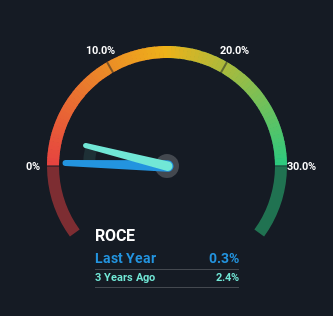- Hong Kong
- /
- Healthcare Services
- /
- SEHK:8357
The Returns On Capital At Republic Healthcare (HKG:8357) Don't Inspire Confidence

If we're looking to avoid a business that is in decline, what are the trends that can warn us ahead of time? Businesses in decline often have two underlying trends, firstly, a declining return on capital employed (ROCE) and a declining base of capital employed. This reveals that the company isn't compounding shareholder wealth because returns are falling and its net asset base is shrinking. So after we looked into Republic Healthcare (HKG:8357), the trends above didn't look too great.
Return On Capital Employed (ROCE): What Is It?
Just to clarify if you're unsure, ROCE is a metric for evaluating how much pre-tax income (in percentage terms) a company earns on the capital invested in its business. The formula for this calculation on Republic Healthcare is:
Return on Capital Employed = Earnings Before Interest and Tax (EBIT) ÷ (Total Assets - Current Liabilities)
0.0028 = S$41k ÷ (S$16m - S$2.1m) (Based on the trailing twelve months to June 2023).
Therefore, Republic Healthcare has an ROCE of 0.3%. In absolute terms, that's a low return and it also under-performs the Healthcare industry average of 12%.
View our latest analysis for Republic Healthcare

Historical performance is a great place to start when researching a stock so above you can see the gauge for Republic Healthcare's ROCE against it's prior returns. If you're interested in investigating Republic Healthcare's past further, check out this free graph of past earnings, revenue and cash flow.
So How Is Republic Healthcare's ROCE Trending?
There is reason to be cautious about Republic Healthcare, given the returns are trending downwards. To be more specific, the ROCE was 24% five years ago, but since then it has dropped noticeably. Meanwhile, capital employed in the business has stayed roughly the flat over the period. Companies that exhibit these attributes tend to not be shrinking, but they can be mature and facing pressure on their margins from competition. If these trends continue, we wouldn't expect Republic Healthcare to turn into a multi-bagger.
The Bottom Line
All in all, the lower returns from the same amount of capital employed aren't exactly signs of a compounding machine. This could explain why the stock has sunk a total of 74% in the last five years. With underlying trends that aren't great in these areas, we'd consider looking elsewhere.
On a final note, we found 2 warning signs for Republic Healthcare (1 shouldn't be ignored) you should be aware of.
While Republic Healthcare isn't earning the highest return, check out this free list of companies that are earning high returns on equity with solid balance sheets.
New: AI Stock Screener & Alerts
Our new AI Stock Screener scans the market every day to uncover opportunities.
• Dividend Powerhouses (3%+ Yield)
• Undervalued Small Caps with Insider Buying
• High growth Tech and AI Companies
Or build your own from over 50 metrics.
Have feedback on this article? Concerned about the content? Get in touch with us directly. Alternatively, email editorial-team (at) simplywallst.com.
This article by Simply Wall St is general in nature. We provide commentary based on historical data and analyst forecasts only using an unbiased methodology and our articles are not intended to be financial advice. It does not constitute a recommendation to buy or sell any stock, and does not take account of your objectives, or your financial situation. We aim to bring you long-term focused analysis driven by fundamental data. Note that our analysis may not factor in the latest price-sensitive company announcements or qualitative material. Simply Wall St has no position in any stocks mentioned.
About SEHK:8357
Republic Healthcare
An investment holding company, operates medical clinics under the Dr.
Flawless balance sheet low.
Market Insights
Community Narratives




